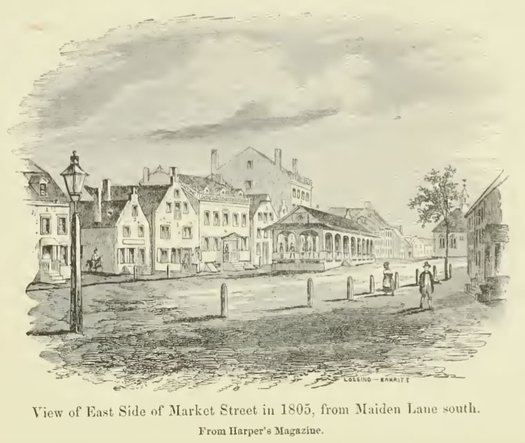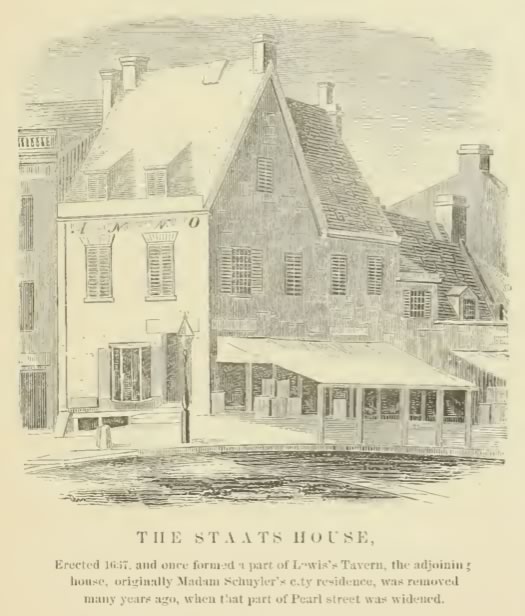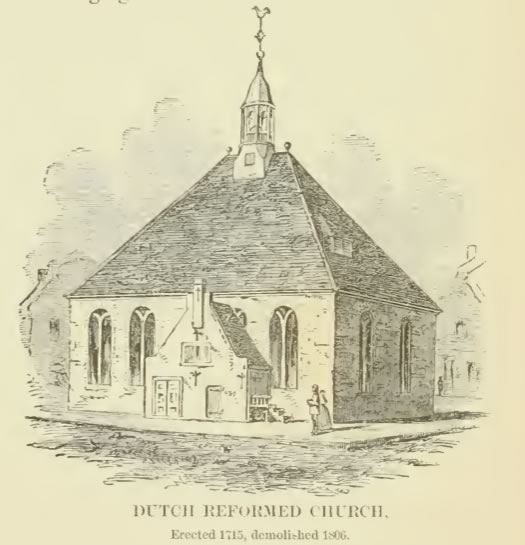"Albany was indeed Dutch, in all its moods and tenses; thoroughly and inveterately Dutch."

You know Market Street -- it's now called Broadway. (And, of course, Maiden Lane is still Maiden Lane.)
Even the dogs changed their accents.
One of the accounts we referenced in that post earlier this week about the total solar eclipse that passed over Albany in 1806 was a memoir of sorts called Random Recollections of Albany: From 1800 to 1808. It was written by Gorham A. Worth, a banker who had lived here during his 20s and then went on to make a lot of money and impart upon the world his recollections of multiple places, including Hudson and Cincinnati.
Anyway, there's an interesting section early in Worth's book that recalls a significant change in Albany: the shift from Dutch culture to a more English/American/Yankee culture. Spoiler: Albany wasn't a fan of change
"The Yankees were creeping in. Every day added to their number; and the unhallowed hand of innovation was seen pointing its impertinent finger at the cherished habits and venerated customs of the ancient burgers."
It's a fun and interesting read, so we clipped it...
Worth's recollection of Albany in 1800 is of a city that he regarded as a kind of backwater -- but, um, in a good way. "Nothing could be more unique or picturesque to the eye, than Albany in its primitive days. Even at the period above mentioned, it struck me as peculiarly naive and beautiful. All was antique, clean and quiet."
He continues a little later on...
Pearl street, it must be remembered, was, in those days, the west end for the town; for there the town ended, and there resided some of the most aristocratic of the ancient burgers. There, a little after sunrise, in a mild spring morning, might be seen, sitting by the side of their doors, the ancient and venerable mynheers with their little sharp cocked hats, or red-ringed worsted caps (as the case might be), drawn tight over their heads. There they sat, like monuments of a former age, still lingering on the verge of time; or like mile-stones upon a turnpike road, solus in solo! or, in simple English, unlike any thing I had ever seen before. But there they sat, smoking their pipes in that dignified silence, and with that phlegmatic gravity, which would have done honor to Sir Wonter Van Twiller, or even to Puffendorf himself. The whole line of the street, on either side, was dotted by the little clouds of smoke, that, issuing from their pipes, and, curling around their noddles, rose slowly up the antique gables, and mingled with the morning air; giving beauty to the scene, and adding an air of life to the picture. But the great charm was in the novelty of the thing. I had seen a Dutch house before, but never till then had I seen a row of Dutchmen smoking in a Dutch city.

Albany was indeed Dutch, in all its moods and tenses; thoroughly and inveterately Dutch. The buildings were Dutch--Dutch in style, in position, attitude and aspect. The people were Dutch, the horses were Dutch, and even the dogs were Dutch. If any confirmation were wanting, as to the origin and character of the place, it might be found in the old Dutch church, which was itself always to be found in the middle of State street, looking as if it had been wheeled out of line by the giants of old, and there left; or had dropped down from the clouds in a dark night, and had stuck fast where it fell.
All the old buildings in the city -- and they constituted a large majority -- were but one story high, with sharp peaked roofs, surmounted by a rooster, vulgarly called a weathercock. Every house, having any pretensions to dignity, was placed with its gable end to the street, and was ornamented with huge iron numericals, announcing the date of its erection; while from its eaves long wooden gutters, or spouts, projected in front some six or seven feet, so as to discharge the water from the roof, when it rained, directly over the centre of the sidewalls. This was probably contrived for the benefit of those who were compelled to be out in wet weather, as it furnished them with an extra shower-bath free of expense.
But the destined hour was drawing near. The Yankees were creeping in. Every day added to their number; and the unhallowed hand of innovation was seen pointing its impertinent finger at the cherished habits and venerated customs of the ancient burgers. These meddling eastern Saxons at length obtained a majority in the city councils; and then came an order, with a handsaw, to "cut off those spouts." Nothing could exceed the consternation of the aforesaid burgers, upon the announcement of this order. Had it been a decree abolishing their mother tongue, it could hardly have excited greater astonishment, or greater indignation. "What!" said they, "are our own spouts, then, to be measured and graduated by a corporation standard! Are they to be cut off or foreshortened, without our knowledge or consent!" But the Dutch still retained the obstinacy, if not the valor, of their ancestors. They rallied their forces and at the next election, the principal author of the obnoxious order (my old friend Elkanah Watson), was elected a constable of the ward in which he lived! This done, they went to sleep again; and before they awoke, new swarms had arrived, and a complete and thorough revolution had taken place. The Yankees were in possession of the city! and the fate of the Dutch was sealed.
Worth then describes in some detail a political fight in 1803 or 1804 between the new-school and old-school residents in Albany -- or at least, the people who considered themselves old school. Apparently it was the talk of the town and a heated subject in the media of the time. ("One piece in particular, entitled The Conspiracy of the Nobles, written in mock heroic verse, contained some capital hits.") The new school eventually wins out.
A restless, leveling, innovating spirit, now prevailed throughout the city. The detested word improvement was in every mouth, and resistance was unavailing. The stinted pines became alarmed, and gradually receded. The hills themselves gave way. New streets opened their extended lines, and the old ones grew wider. The roosters on the gable heads, that for more than a century had braved the Indians and the breeze; that had even flapped their wings and crowed in the face of Burgoyne himself, now gave it up, and came quietly down. The gables in despair soon followed, and more imposing fronts soon reared their corniced heads. The old Dutch Church itself, thought to be immortal, submitted to its fate and fell! not at the foot of Pompey's statute, exactly, but at the foot of State street, which freed from the obstruction thenceforward became the Rialto of the city, where pedlers of stale sea-cod, and country hucksters, now do congregate.

Even the dogs now began to bark in broken English; many of them, indeed, had already caught the Yankee twang, so rapid was the progress of refinement. In the process of a few brief years, all that was venerable in the eyes of the ancient burgers disappeared. Then came the great eclipse of 1806, which clearly announced the fall and final end of the Dutch dynasty. It is hardly necessary to say, that not an iron rooster has crowed upon the gable heads, nor a civil cocked hat been seen in the ancient city of Albany, from that day to this.
Worth then goes on to discuss the famous local families of the time, many of them with names that still echo today: Van Rensselaer, Ten Broeck, Gansevoort, Lansing, Van Schaick, Ten Eyck, Pruyn, and so on.
Hi there. Comments have been closed for this item. Still have something to say? Contact us.
Comments
One of the best examples of the dwindling Dutch-ness of Albany can be seen in the city’s brewing industry at the turn of the 19th century. During the 17th and most of 18th century Some of the most well-known names of Albany’s past—like the Van Schiacks, Rutgers, Ryckmans, Douws and Gansevoorts—were Dutch family brewers.
There was however, at the end of the 18th century, a clear shift in brewing in Albany. Peter Gansevoort, by the 1790s, was the last of the Dutch family brewers, and in 1805 closed his brewery after a nearly 150 year run. Scottish and English brewers arrived by the scores, and men like James Boyd and Edward LeBreton began opening “modern†breweries around the city.
Although never a particularly successful or profitable grain to grow in the Northeast, barley was beginning to replace wheat and oats as the primary brewing grain in the Hudson Valley. New barley varieties introduced by the Scots in the 1750s, began catching on by the late 1780s and 1790s, and by the turn of the 19th century, barley had become more available and more popular amongst Albany brewers.
... said Craig on Aug 24, 2017 at 11:09 PM | link
Fascinating stuff, Craig's comment included. I find the Dutch history of Albany and the Capital Region so interesting.
... said Ellen on Aug 25, 2017 at 4:47 PM | link
So sad that that Dutch did not try and fight back.
... said Terrell L. Howard on Aug 28, 2017 at 7:54 AM | link
This is wonderful-- thanks for posting it!
... said LC on Aug 31, 2017 at 2:31 PM | link